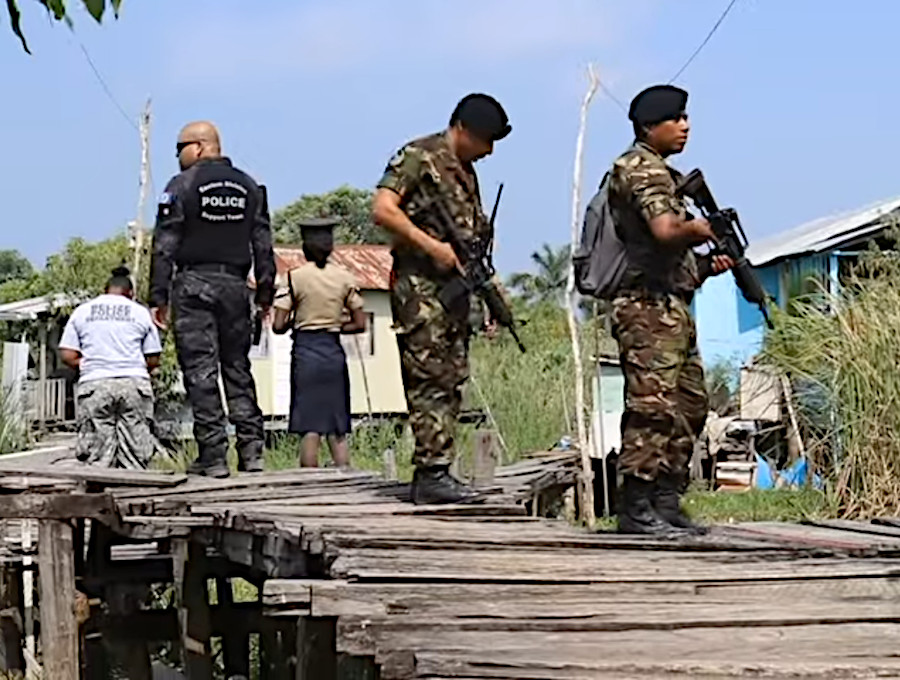Georgetown et al. In view of rising murder rates, the states of the Caribbean see organized crime violence as the region’s biggest problem.
Caribbean Community (Caricom) Secretary General Carla Barnett has described gang violence as “an epidemic” designated. It urges “to increase human and financial resources, address the root causes of crime and mitigate the devastating effects of violence in societies.”
In recent years, the Caribbean has become the region of the world with the highest murder rates, ahead of Central America developed. Countries such as Jamaica, Saint Vincent and the Grenadines, Trinidad and Tobago, the Bahamas and Belize consistently rank among the countries in the world with the highest murder rates. The latest report from the United Nations Office on Drugs and Crime found that the region “has experienced the most spectacular rise in murder violence in recent years, largely due to intense competition between gangs for drug markets.”
The Caribbean is a transit zone between the narcotics producing countries in Central and South America and the purchasing countries in North America and Europe.
Experts also point out the importance of poverty and the informal economy for organized crime. In many Caribbean countries, up to a third of economic output is generated in the informal sector. This situation results in a high percentage of Caribbean populations experiencing precarious public conditions and lacking full access to housing, basic energy, health and education services, and justice.
Many criminal organizations have their own economy built up, which includes drug trafficking, illegal mining, smuggling or human trafficking. This allows them to create jobs and build infrastructure that creates a social base for the criminal operations. Due to their financial resources, the gangs are often better equipped than the state security forces.
The Caricom states also point to US responsibility for the violence: they are the main source of illegal firearms and ammunition. The Prime Minister of the Bahamas, Philip Davis, has denounced that 98.6 percent of all illegal firearms seized in his country come directly from the United States. “We have called on the U.S. government and U.S. weapons manufacturers to work with Caricom member states,” Davis said. The Bahamas and other Caribbean countries have joined a lawsuit filed by Mexico against US arms manufacturers. The plaintiff states are demanding ten billion US dollars in compensation for the damage caused on their territory by weapons produced in the USA.
Experts demand that the “war on drugs” that has been waged for over 50 years must be recognized as lost. Román David Ortiz Marina, consultant and professor of Latin American and European security issues, criticizes the fact that the phenomenon is still classified exclusively as one of “organized crime”. This ignores the social causes and the now enormous political consequences when states lose control over their territories.
The National Assembly of the Bahamas introduced a number of tightening laws at the beginning of April adopted. In the future, organized crime activities can be punished with fines of up to $100,000 and up to 25 years in prison. Tattoos, body markings, signs, or clothing may be interpreted by courts as evidence of gang membership.
President Philip Davis justified the tightening by saying that a series of murders on the island of New Providence were committed by perpetrators who were released after paying bail despite serious crimes. In recent years, the Bahamas has consistently been one of the countries in the world with the highest murder rate.
Parts of Belize will be under a state of emergency in March 2024 due to increasing violence called out been. Governor General Dame Froyla Tzalam imposed it on the south of the capital Belize City and parts of the Cayo District because of gang activity. In Belize, the Bloods and Crips gangs, which were founded in the USA, engage in bloody clashes.
The Dominican Republic itself is one of the safest countries in the region. But the country’s geographical location makes it an important transshipment point for cocaine. The “Trinitarios” gang, founded in 1989 by Dominican prisoners in the USA, plays a central role in the international drug trade and is said to have more than 30,000 members today. They are active in the USA, Spain and Italy.
In 2023, Jamaica was replaced by the Caribbean country of Saint Kitts and Nevis as the country with the highest murder rate in the world. In 2023, the murder rate was 60.9 per 100,000 inhabitants.
“Jamaica is not a country at war, but our murder rate, our deaths from violence, is commensurate with countries at war,” said Prime Minister Andrew Holness. In 2017, Jamaican authorities counted 257 active gang structures. They emerged in the slums of the capital Kingston and began extortion and selling drugs. Some of the gangs have now grown into powerful organizations that negotiate with political parties to exchange votes in elections and public contracts.
In recent years, Trinidad and Tobago has consistently been one of the countries with the highest murder rates. In 2022, the country recorded a record of more than 600 murders, almost twice as many as ten years ago. “It is a war we cannot afford to lose,” said Prime Minister Keith Rowley. In Trinidad and Tobago the situation is exacerbated by ethno-religious conflicts. Muslim gangs like the “Unruly ISIS” fight against non-Muslim gangs like the “Rasta City”.
